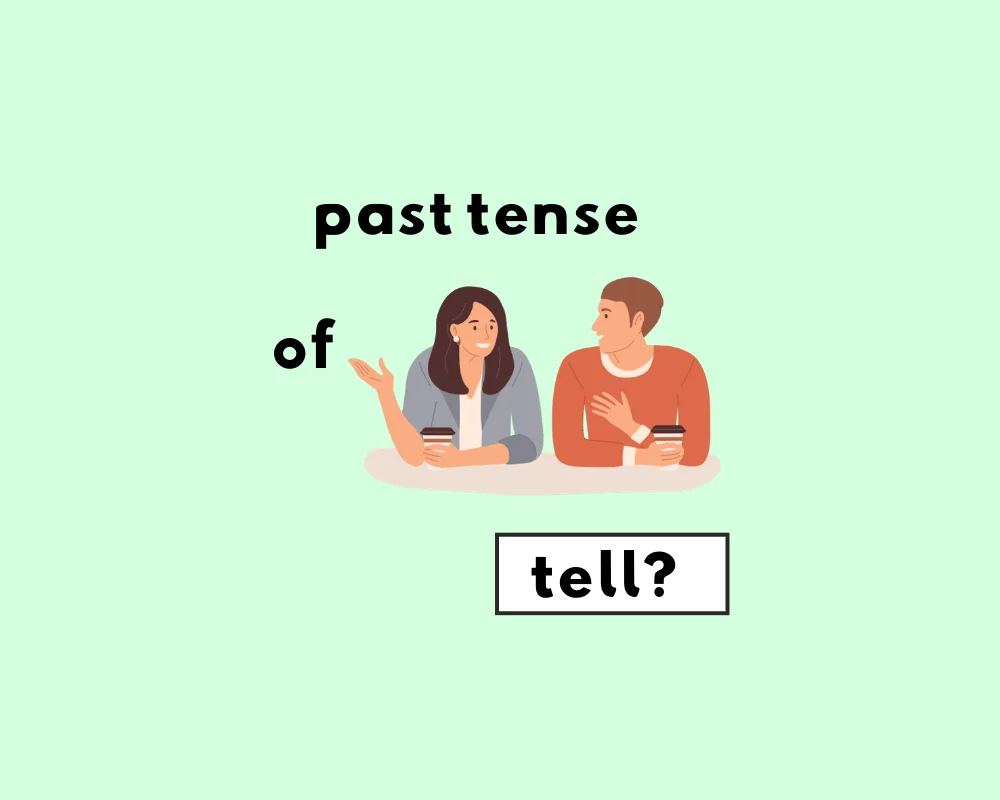
Contents
Toggle
What’s the past tense of “tell”?
The past tense of the present tense verb, tell (rhymes with yell), is told (rhymes with sold). The past participle form of tell also told, which makes tell an irregular verb, since tell doesn’t end in -ed in either of its past verb conjugations. Please, allow us to tell you more about this awkward, and oh-so-irregular verb, to tell.
Forms of the verb tell
The verb to tell is defined by the Oxford Learner’s Dictionary as “(of a person) to give information to somebody by speaking or writing: Did she tell you her name?“.
| present | past | future | |
| simple | I tell | I told | I will tell |
| continuous | I am telling | I was telling | I will be telling |
| perfect | I have told | I had told | I will have told |
| perfect continuous | I have been telling | I had been telling | I will have been telling |
To tell is in the present tense: I want to tell you something.
Told is in the simple past: He told everybody he saw the news.
Told is also the past participle form of the verb: They’ve told us that they’re not coming.
To tell is the present and future tense form of the action and verb, to tell. The present participle form of tell is tell–ing (present participles are formed by adding –ing). Since tell has two verb forms in total: tell and told, it is part of the cohort of verbs that are irregular, and likewise have two forms altogether:
| base verb | past tense | past participle |
| spit | spat | spat |
| sit | sat | sat |
| tell | told | told |
| win | won | won |
| shoot | shot | shot |
| lose | lost | lost |
Tell vs told
See the following past verb forms of tell:
Past tense: He told the news to everybody he saw.
Past participle: I have told them all the answers numerous times.
The distinction between participles and verbs, broadly speaking, is that participles are forms of verbs rather than tenses proper. Additionally, participles require helper or auxiliary verbs, like has, have, and had. This is what largely tells participles apart from tenses. Participles are, as we say here, (at Grammarflex), a philological doozy—and conceptual crackerjack. We have dedicated this article to participles, and intend to discuss them again, in the future… tense.
The verb to tell in sentence examples
1. Did she tell you her name?
2. Tell me where you live.
3. I tell my friends about my evening every day.
4. She tells her son a story before she goes to bed.
5. He tells the truth to the police.
The past tense told used in sentences
1. He told everybody he saw the news.
2. ‘We hope that there will be some progress,’ he told reporters.
3. He later told the court that he had returned the money.
4. They told us what happened during the meeting yesterday.
5. Can you tell me if you told them about the change of plans?
The past participle told used in sentence
1. He has told her parents about the decision.
2. She has been told by her coach to practice more.
3. We had told our friends about the party before it started.
4. They’ve told us that they’re not coming.
5. We have told them about the new policy.
Synonyms of tell
- reveal
- inform
- say
- communicate
- describe
- report
Idioms/phrases with tell
- Hear tell of something
- Does Macy’s tell Gimble’s?
- To tell chalk from cheese
- Live to tell the tale
- Tell it to the Marines!
- Tell-all
- Tell the truth and shame the devil
- You can’t tell (or judge) a book by it’s cover
- Tell it like it is
Origin of the verb tell
From etymology online on tell (v.):
Old English tellan “to reckon, calculate, number, compute; consider, think, esteem, account”, from Proto-Germanic taljan* “to mention in order”.
Commonly confused verb tenses
- What’s the past tense of spread?
- What’s the past tense of lead?
- What’s the past tense of choose?
- What’s the past tense of fly?
- What’s the past tense of lay?
- What’s the past tense of drive?
- What’s the past tense of draw?
Sources
- Harper, Douglas. “Etymology of tell.” Online Etymology Dictionary, https://www.etymonline.com/word/tell. Accessed 16 January, 2023.
- “Tell.” TheFreeDictionary.com. 2023. Farlex, Inc. 16 Jan. 2023 https://idioms.thefreedictionary.com/tell










